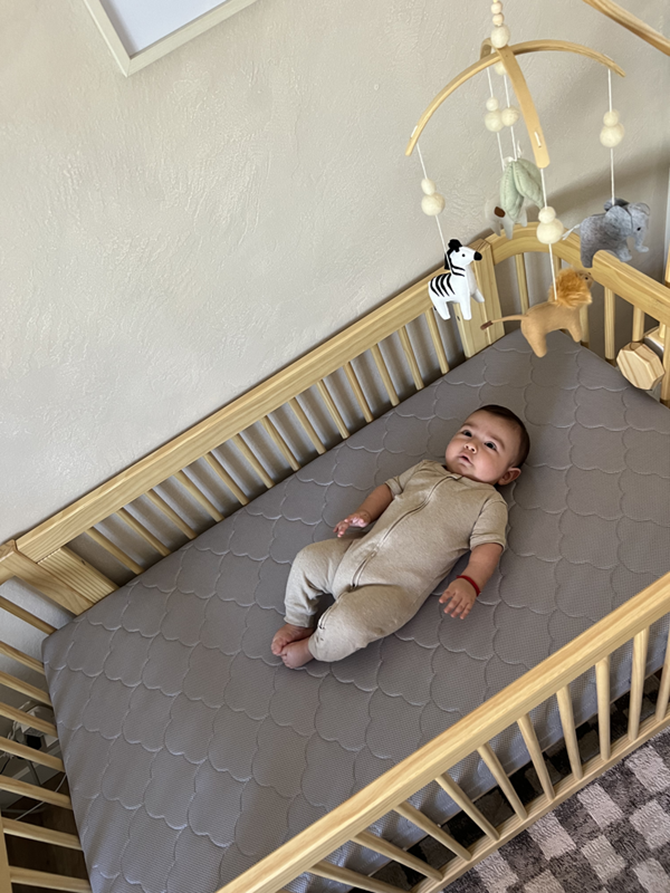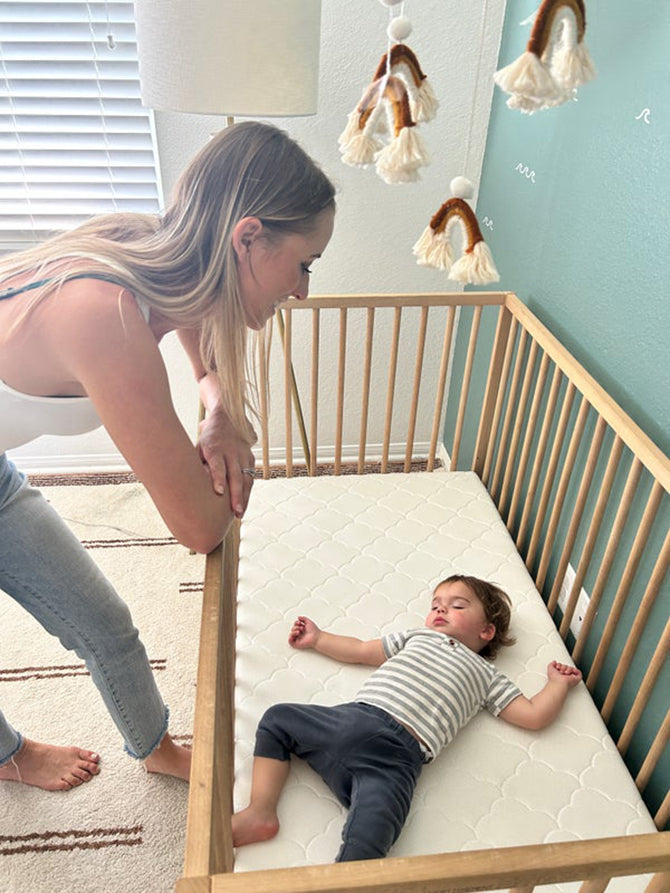
Are you wondering why your 9-month-old, who used to sleep so peacefully, is back to waking up every few hours? It could be the 9-month sleep regression, a common phase that many babies go through.
In this article, we’ll discuss the signs and potential causes of this sleep regression. We’ll also share some tips to help you cope with the changes and get your little one back to sleep.
Table of contents
- What is a sleep regression?
- Signs of the 9-month sleep regression
- What causes the 9-month sleep regression?
- Surviving the 9-month sleep regression
What is a sleep regression?

A sleep regression is a temporary disruption in a baby’s sleep pattern. It typically occurs when a baby who has been sleeping well suddenly starts waking up frequently during the night or has trouble falling asleep.
Ages of common sleep regressions
Unfortunately, babies often undergo more than one sleep regression in their first few years. You may have already survived one (or two) of them.
While sleep regressions can happen at any age, they commonly occur at:
How long do sleep regressions last?
No matter when your baby’s sleep regression occurs, it can feel never-ending in the moment. But, thankfully, most only last between two and six weeks.
However, there are always exceptions to the rules. Some babies may only have trouble sleeping for five or six days, while others may struggle for several months. Every baby is different.
Signs of a 9-month sleep regression
If your baby is around nine months of age and you’re experiencing significant sleep disturbances, there’s a good chance you’re dealing with the 9-month sleep regression.
Here are some common signs to watch for:
- Fighting going to sleep
- Waking up more than usual during the night
- Refusing to go to bed after waking
- Increased fussiness during the day
- Changes in appetite
- Shorter naps
Your baby may exhibit some or all of these signs.
What causes the 9-month sleep regression?

Teething pain
At nine months old, your baby may be cutting some new teeth. This can cause discomfort and pain, making it difficult for them to fall asleep and stay asleep.
If you suspect your little one is teething, gently open their mouth and look at their gums. Do you see any blisters, swelling, or redness? Those are all signs of teeth coming in.
You may also notice symptoms such as:
- Excessive drooling
- Irritability
- Difficulty eating solid food or chewing
Gaining new skills
Your baby is hard at work trying to master new skills. It’s not uncommon for them to start crawling, pulling up, and even standing at this age. These new abilities may be a source of excitement and overstimulation, making it difficult for your baby to relax and fall asleep.
They may want to practice their new skills instead of going to bed. Some babies even wake up to practice crawling or standing in their cribs at night.
As frustrating as this may be, remember that it’s a sign of healthy development and won’t last forever. So celebrate the progress, even though you’re exhausted!
Schedule changes
Has anything new happened lately that’s changed your little one’s schedule?
Here are a few scenarios that could contribute to a sleep regression:
- Switching caregivers or starting daycare
- Traveling, especially if you switch time zones
- Dietary changes such as starting chunkier solids or switching from breastfeeding to bottles
- Getting introduced to a new sibling
If any of these changes occur, your baby may struggle to adjust. This can cause them to become more clingy or fussy and have trouble falling asleep.
Separation anxiety

Around this age, babies can start experiencing separation anxiety. They’ve discovered that the two of you are separate individuals, and being away from you can be scary.
You may notice that your baby starts to cry or fuss more when you leave the room, even if they never have before. This can make bedtime harder, as they may not want to be left alone in the nursery.
Hunger
Between eight and nine months, your baby’s brain goes through a growth spurt. They’re learning more about emotions and linking words with their meaning.
All of this growth requires energy. And energy comes from food.
If your little one seems hungrier than usual, it could be because they need more fuel to support their rapid development. They may want to eat around the clock again. But rest assured, they will return to a more normal eating schedule soon.
Other causes of sleep trouble
Sometimes, your little one may have something else going on that’s causing them to struggle with sleep even when they’re not in a sleep regression. Here are a couple of examples.
Constipation
Your baby’s digestive system is still developing. They can easily become constipated if they’re eating more solid food and not getting enough fiber or liquid.
If they aren’t having regular bowel movements or their poop seems hard or dry, they could be constipated. You’ll want to talk to their doctor about ways to ease their discomfort and keep their stools soft.
Illness
When you’re sick, it can affect your ability to sleep. The same is true for your baby. If they’re dealing with a cold, allergies, or any other illness, it can disrupt their sleep.
Surviving the 9-month sleep regression

If your baby is going through a sleep regression, you may feel like you’re back to those early days of newborn sleep deprivation. It can be pretty discouraging, and you may wonder if your baby will ever sleep through the night again.
The good news is that this, too, shall pass. The following tips can help you get through this phase.
Establish a regular bedtime routine
Routines are important for babies. A consistent bedtime routine can help signal that it’s time for bed and help them wind down for the night.
Keep your routine simple enough to do every night. For example, it might include a few of the following activities:
- Bath time
- Read a book
- Sing a lullaby
- Place in the crib
- Rub and pat for a few moments before leaving the room
Treat any underlying conditions
If your baby is teething or sick, they may not sleep well until those issues are resolved. Consult your doctor for advice and provide some extra snuggles during this time.
Give your baby time to work on their new skills
Babies need time to practice their fine and gross motor skills during the day. Not only can this help them get stronger, but it also allows them to burn off some energy before bedtime.
The Newton Baby Travel Crib and Play Yard provides a safe location for your little one to play, as seen in this quick video:
Try a dream feed
Hungry babies don’t sleep well. If your little one is waking up because their belly is empty, a dream feed could help. That’s when you gently rouse your baby to nurse or take a bottle before you go to bed for the night.
With a full belly, they’re more likely to sleep longer.
Ensure a comfortable sleep space
Babies need a safe, comfortable place to sleep. Here are a few tips to help you create a sleep-friendly environment:
- Use a breathable mattress from Newton Baby
- Make sure their sleep space is free from any loose objects, blankets, or pillows that could increase the risk of suffocation
- Keep the room at a comfortable temperature
- Try a white noise machine to help drown out any outside noises that could disturb them
- Keep the room dark with blackout curtains or shades
- Have a consistent bedtime
Try sleep training
Some babies need a little extra help learning how to sleep well on their own. Sleep is like any other skill; it takes practice and consistency. Sleep training can help with that.
And don’t worry; you don’t have to let your baby cry it out if you don’t want to. There are other options.
Reading about different sleep training methods and speaking to your pediatrician can help you choose a method that aligns with your parenting style.
Be patient
Your baby can sense your mood and emotions, often reflecting them back to you. If you’re feeling stressed or anxious about your baby’s sleep, it can amplify the problem.
Remember to be patient with yourself and your little one. You will eventually get some more sleep.
In the meantime, ask your loved ones for some support. Having someone else rock your fussy baby while you nap can be a lifesaver.
Say good night with Newton Baby

The 9-month sleep regression can be a challenging time. But following the tips above can help your little one regain healthy sleep habits.
With a comfortable sleep space (and a cozy, breathable mattress from Newton Baby), a consistent routine, and plenty of patience, you’ll be back to peaceful nights in no time.
Sweet dreams!

